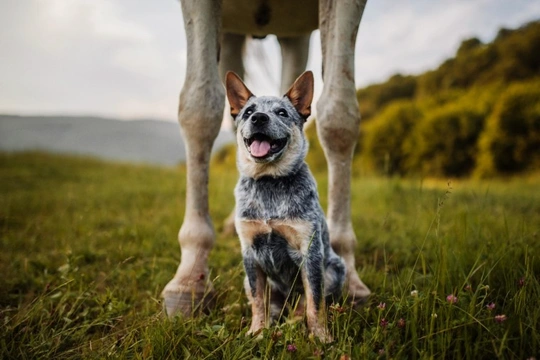
Is horse manure harmful to dogs?
Horse manure is something that many of us contend with every day when we walk our dogs, and some dogs seem to be very adept at finding it and take great pleasure in rolling in it or worse, actually eating it.
If this sounds like your dog, you probably wish they wouldn’t do this and dread the associated clean-up operation – but is horse manure harmful to dogs, or just unpalatable to deal with? Read on to find out.
Horse manure itself is not harmful to dogs…
Horses are vegetarian animals, and as a result of this horse manure is not one of the types of animal poop that we think of as being particularly offensive or noxious – unlike dog poop itself, which very much is!
The waste of vegetarian animals is far less likely to contain harmful things that can poison the ground or other animals, and it is actually commonly used as a garden and agricultural fertilizer, usually after it has begun to break down in a muck heap.
Horse manure itself, being the waste product produced by horses eating a natural diet with no additives is not dangerous to dogs, whether they eat it or roll in it. Horse manure that contains worms, worm eggs or worm larvae (in the case of horses who have intestinal worms) can pass these parasites onto dogs that eat horse manure, however, which means that eating horse manure carries the risk of spreading a parasitic infection to your dog.
This means that horses need to be wormed, just like dogs do; but in wild and native populations of horses and ponies, they are unlikely to be wormed and so can pass worms onto dogs.
In horses and ponies that are wormed, one of the more common and effective wormers used for horses can actually be dangerous to dogs, which we will look at next.
…However, a worming product called Ivermectin that is given to horses can be present in horse manure
Natural horse manure might not be exactly pleasant to deal with if your dog rolls in it or eats it, but it is not harmful to them per se other than it if passes on worms. However, horses and ponies kept as pets and for riding, and those that are otherwise owned and cared for, are generally wormed to a regular schedule just like dogs are.
There are a number of different worming products used for horses, just as there are for dogs, each with their own formulations and brand names, as well as specific active ingredients.
One of the more common active ingredients in worming products given to horses is called Ivermectin, and when horses and ponies are wormed with it, it passes through their body naturally in their manure.
This means that if a dog comes into contact with horse manure, such as by rolling in it or eating it (which many dogs are apt to do) they can come into contact with Ivermectin and potentially ingest it too.
Ivermectin in horse manure can be dangerous to dogs
Ivermectin is not used in wormers for dogs, as it is poisonous to them. This means that the Ivermectin that can be present in horse manure can pose a danger to dogs too, which in turn means that horse manure can potentially be dangerous to dogs, because you won’t know if there is Ivermectin present in it or not.
So, how risky is it if your dog rolls in or eats horse manure?
Rolling in horse manure isn’t likely to hurt your dog
If your dog rolls in horse manure or otherwise messes around in it without eating it, you’ll probably spend the day wondering what you did to deserve the associated clean up required; but on the plus side, you won’t need to worry about having to make a trip to the vet!
Rolling in horse manure might be really irritating for you as the dog’s owner, but it is highly unlikely to do your dog any harm.
If your dog eats horse manure, there is a risk that they may develop Ivermectin poisoning
So, is it dangerous if your dog eats horse manure? Possibly. Horse manure may contain Ivermectin, which means that if your dog eats it there is a risk that they might develop Ivermectin poisoning, and so you should always try to stop your dog from eating horse manure, because of this and also of course because it is gross!
That said, the risk of a dog developing Ivermectin poisoning from eating horse manure is low; so don’t panic too much, but do be aware of the risk.
How dangerous is Ivermectin poisoning to dogs?
Ivermectin poisoning in dogs is serious and acute, and can prove fatal. This means that if your dog does develop Ivermectin poisoning from eating horse manure, they will need to be seen by a vet immediately if they show any symptoms, or even if they feel fine but you know that Ivermectin was present in the horse manure.
That said, the risk of a dog developing ivermectin poisoning from horse manure is relatively low, even if they do eat it; so the risk is serious, but low.



